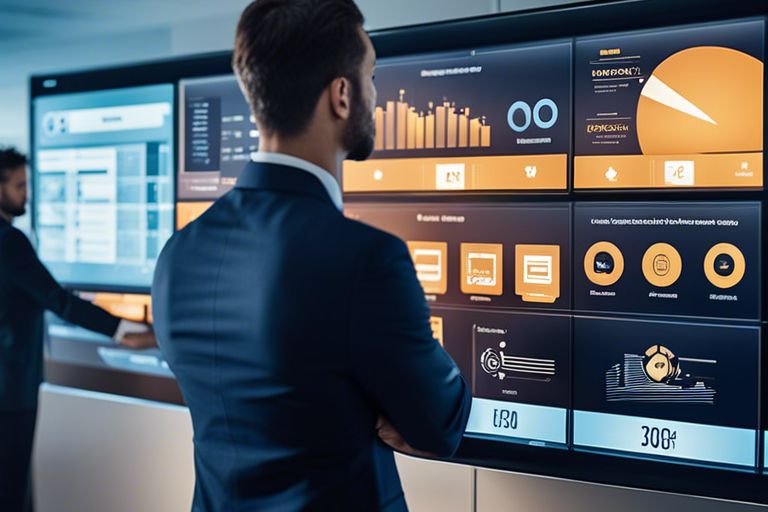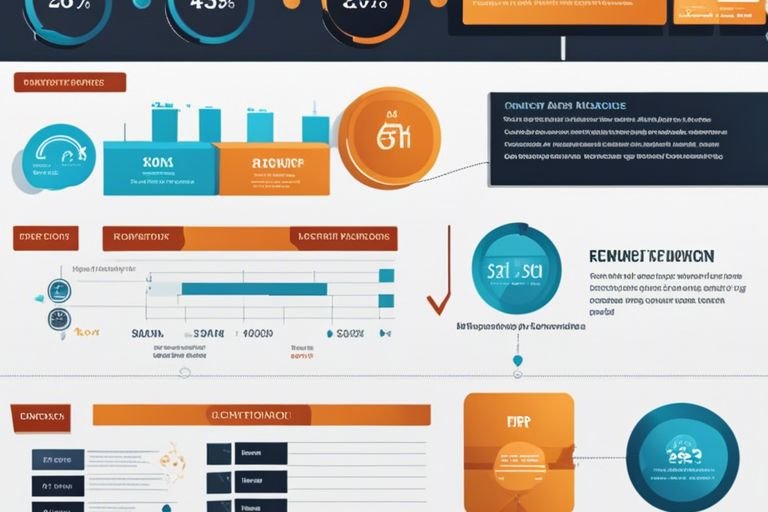How Can ERP Systems Enhance Customer Relationship Management?

Utilizing Enterprise Resource Planning (ERP) systems to enhance customer relationship management (CRM) is a commonly overlooked strategy in the business world. However, integrating these two pivotal systems can have a significant impact on a company’s ability to connect with and serve its customers on a deeper level. ERP systems offer a wealth of benefits, from streamlining processes to providing a centralized hub for customer data, which can ultimately lead to improved customer satisfaction and loyalty. In this blog post, we will explore the various ways in which ERP systems can enhance CRM and how businesses can leverage this integration to drive better customer experiences.
Key Takeaways:
- Improved Data Management: ERP systems can enhance customer relationship management by providing a centralized platform for storing and managing customer data, allowing for a more holistic view of the customer’s interactions with the company.
- Streamlined Processes: By integrating various departments and functions within a company, ERP systems can streamline processes related to customer relationship management, such as order fulfillment, billing, and customer service, leading to improved customer satisfaction.
- Enhanced Analytics: ERP systems can provide powerful analytics tools that can help businesses better understand customer behavior, preferences, and trends, enabling them to make more informed decisions and tailor their offerings to customer needs.
Understanding ERP Systems
Even in today’s fast-paced and highly competitive business environment, many organizations still struggle to fully understand the potential of Enterprise Resource Planning (ERP) systems. At its core, an ERP system is a powerful and integrated software solution that helps businesses manage their day-to-day operations, including accounting, human resources, supply chain management, and more.
The Evolution of ERP Solutions
With the advancement of technology, ERP solutions have evolved significantly over the years. What was once a basic system to manage back-office functions has now become a comprehensive tool that can streamline processes across the entire organization. Modern ERP solutions have also moved from on-premises installations to cloud-based platforms, offering greater flexibility and accessibility for businesses of all sizes.
Core Functionalities of ERP Systems
Evolution in ERP systems has led to the development of core functionalities that are essential for businesses to effectively manage their operations. These functionalities include integrated data and information management, automation of repetitive tasks, and real-time reporting and analytics. By leveraging these core functionalities, organizations can gain a 360-degree view of their operations, make informed decisions, and improve overall efficiency.
It enables businesses to streamline processes, improve communication, and ultimately enhance customer relationship management.
Optimizing Customer Relationship Management through ERP
Obviously, Customer Relationship Management (CRM) is a vital aspect of any business. The ability to effectively manage relationships with customers can make or break a company’s success. This is where Enterprise Resource Planning (ERP) systems come in. By integrating CRM with ERP, businesses can optimize their customer relationship management strategies, leading to improved customer satisfaction, loyalty, and ultimately, increased revenue.
Real-time Customer Data Analysis
Optimizing customer relationship management through ERP involves real-time analysis of customer data. With ERP systems, businesses can gather and analyze customer data from various touchpoints in real-time. This allows for a deeper understanding of customer behavior, preferences, and trends. This, in turn, enables businesses to personalize their interactions with customers, anticipate their needs, and provide timely and relevant offerings.
Automation of CRM Processes
With ERP, automation of CRM processes becomes a reality. Businesses can automate tasks such as lead management, sales forecasting, and customer support. This not only improves operational efficiency but also ensures consistency and accuracy in customer interactions. Automation also frees up valuable time for sales and customer service teams, allowing them to focus on building relationships and providing personalized experiences.
Analysis is also automated, with ERP systems providing advanced analytics tools for gaining insights into customer behavior, buying patterns, and preferences. This allows businesses to make data-driven decisions and tailor their CRM strategies to better meet the needs of their customers.
ERP System Features that Benefit CRM
After implementing an ERP system, organizations can leverage several features that directly benefit Customer Relationship Management (CRM). These features include centralized customer information, enhanced communication channels, improved sales and marketing strategies, and advanced reporting and forecasting tools.
Centralized Customer Information
One of the key benefits of integrating ERP and CRM is the ability to access centralized customer information. By consolidating customer data from various departments and touchpoints, organizations can gain a 360-degree view of their customers. This holistic view allows for better understanding of customer needs and behaviors, leading to more personalized interactions and improved customer satisfaction.
Enhanced Communication Channels
Information silos can hinder effective communication with customers. By integrating ERP and CRM systems, organizations can break down these barriers and establish seamless communication channels. This includes integrating email, phone, and social media interactions into a single platform, enabling customer support representatives to access relevant customer information and provide a unified and consistent experience.
A centralized system also allows for automation of communication processes, such as sending personalized marketing emails based on customer interactions and behavior. This ensures timely and targeted communication with customers, ultimately leading to increased engagement and loyalty.
Improved Sales and Marketing Strategies
Improved integration between ERP and CRM systems enables organizations to align their sales and marketing strategies more effectively. By analyzing customer data and purchase history, sales and marketing teams can tailor their campaigns to specific customer segments and create personalized offers that are more likely to convert. This targeted approach can lead to increased sales and higher customer retention rates.
Sales and marketing teams can also benefit from real-time visibility into inventory levels and order fulfillment, allowing them to make more informed decisions and capitalize on sales opportunities.
Advanced Reporting and Forecasting Tools
ERP systems provide advanced reporting and forecasting tools that directly benefit CRM efforts. These tools allow organizations to analyze customer data and trends, identify sales opportunities, and forecast customer behavior. By leveraging these insights, organizations can make strategic decisions to optimize their sales and marketing efforts, ultimately improving customer satisfaction and loyalty.
| Benefits | Impacts |
| Identifying sales trends | Optimizing marketing campaigns |
| Forecasting customer behavior | Improving customer satisfaction |
Plus, these tools enable organizations to track key performance indicators (KPIs) related to customer interactions and sales activities, providing insights to refine CRM strategies and drive business growth.
Case Studies and Industry Applications
Despite the wide range of industries that utilize ERP systems, many companies are still hesitant about their potential impact on customer relationship management. Here are some case studies that illustrate how ERP systems have enhanced CRM for various organizations:
- A global manufacturing company saw a 20% improvement in customer satisfaction after implementing an ERP system that integrated customer data from sales, manufacturing, and shipping departments.
- A financial services firm experienced a 15% increase in cross-selling opportunities and a 25% reduction in customer churn by leveraging CRM data within their ERP platform.
- A retail chain improved inventory management and reduced lead times by 30% through the use of ERP-driven customer insights to optimize supply chain operations.
Success Stories in Various Sectors
With ERP systems, companies across diverse industries have achieved significant improvements in customer relationship management. From manufacturing to financial services to retail, the integration of CRM data within ERP platforms has led to enhanced customer satisfaction, increased cross-selling opportunities, and streamlined operational efficiency.
Lessons Learned and Best Practices
The successful implementation of ERP systems for CRM enhancement has revealed some valuable lessons and best practices. The alignment of CRM and ERP strategies, careful data integration, and robust analytics capabilities are key factors in achieving tangible benefits for customer relationship management.
Best practices in this area include effective collaboration between sales, marketing, and customer service teams; proactive data governance to ensure accuracy and relevance of CRM data; and a customer-centric approach to ERP system configuration and customization.

Implementation Strategies
Keep in mind that a successful ERP-CRM integration requires careful planning and execution. There are several key strategies to consider when implementing ERP systems to enhance customer relationship management.
Planning and Designing the ERP-CRM Integration
ERPCRM integration begins with careful planning and designing to ensure seamless integration of the two systems. This involves analyzing the existing processes and workflows of both ERP and CRM systems, identifying the data points that need to be shared between the two systems, and designing a roadmap for integration. It’s essential to involve key stakeholders from both the ERP and CRM teams to ensure that the integration meets the needs of all departments and aligns with the overall business objectives. Additionally, it’s crucial to establish clear communication channels and define roles and responsibilities throughout the integration process to ensure smooth collaboration between teams.
Critical Factors for Successful Implementation
Factors such as thorough training, effective change management, and robust data governance are critical for the successful implementation of ERP-CRM integration. Thorough training ensures that all users are well-equipped to leverage the integrated system, while effective change management helps in addressing any resistance to change and facilitating a smooth transition. Additionally, robust data governance is essential to maintain data integrity and security across both ERP and CRM systems. Knowing the importance of these factors can help organizations mitigate potential risks and ensure a successful implementation.
- Thorough training for all users
- Effective change management
- Robust data governance
The understanding and implementation of these critical factors are paramount to the success of ERP-CRM integration. Thorough training, effective change management, and robust data governance are essential components that organizations must prioritize to ensure a seamless and successful integration of their ERP and CRM systems.
Future Trends and Evolving Technologies
Unlike traditional ERP-CRM systems, future trends and evolving technologies are shaping the way organizations approach customer relationship management. These advancements are revolutionizing the ways in which businesses interact with their customers, providing insights and tools that were previously unimaginable.
AI and Machine Learning in ERP-CRM Systems
On the forefront of this revolution are AI and machine learning technologies, which are increasingly being integrated into ERP-CRM systems. These technologies have the potential to transform the way businesses manage customer relationships, by automating tasks, analyzing data, and providing valuable insights that can drive more personalized and effective interactions with customers. AI and machine learning algorithms can analyze vast amounts of customer data to identify patterns and trends, enabling businesses to anticipate customer needs and behavior in ways that were previously impossible.
The Role of IoT and Big Data
Role As IoT devices and big data continue to proliferate, their role in ERP-CRM systems is becoming increasingly important. IoT devices can capture and transmit real-time data from customer interactions, allowing businesses to gain deeper insights into customer behavior and preferences. This data, when combined with big data analytics, can provide businesses with a comprehensive view of their customers’ journey, enabling them to better understand and anticipate their needs.
Technologies such as IoT, big data, AI, and machine learning are driving the future of ERP-CRM systems, providing businesses with the tools and insights they need to build stronger, more personalized relationships with their customers. By harnessing the power of these technologies, organizations can gain a competitive edge in today’s rapidly evolving business landscape.
Challenges and Considerations
Not without its challenges, the implementation of ERP systems for enhancing customer relationship management requires careful consideration of various factors.
Data Security and Privacy Issues
Issues surrounding data security and privacy must be taken into account when integrating ERP systems with customer relationship management. With the collection and storage of vast amounts of customer data, there is a heightened risk of security breaches and privacy violations. It is crucial to implement robust security measures and adhere to regulations such as GDPR to ensure the protection of customer information.
Change Management and User Adoption
User adoption and change management are essential considerations when implementing ERP systems to enhance customer relationship management. Users across different departments and roles will need to adapt to new processes and technologies. It is imperative to provide comprehensive training and communication to facilitate a smooth transition and ensure widespread acceptance of the new system.
Data, training, communication, technology, processes, adoption, and change management are all crucial aspects to be addressed when integrating ERP systems for enhancing customer relationship management.
The Benefits of ERP Systems in Enhancing Customer Relationship Management
The integration of ERP systems with customer relationship management can greatly improve the way businesses interact with their customers. By having access to real-time data and streamlined processes, companies are able to provide more personalized and efficient service to their customers. ERP systems also help in tracking customer interactions and preferences, allowing for more targeted marketing and sales strategies. Additionally, the automation of various tasks through ERP systems frees up time for employees to focus on building better relationships with customers. Overall, the implementation of ERP systems can lead to higher customer satisfaction and loyalty, ultimately driving business success.



